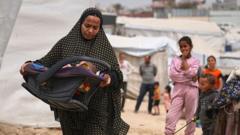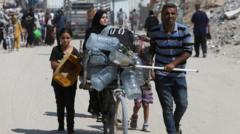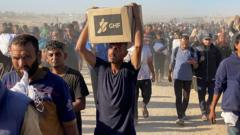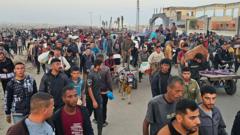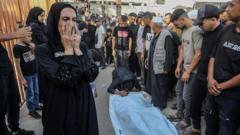Israeli fire results in the deaths of 27 Palestinians near an aid distribution site, igniting criticism of military tactics and humanitarian operations in Gaza.**
Fatal Incident at Aid Distribution Site Claims 27 Lives in Gaza**
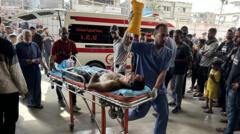
Fatal Incident at Aid Distribution Site Claims 27 Lives in Gaza**
Clash between Israeli forces and Palestinians seeking aid leads to casualties amidst a controversial humanitarian operation.**
At least 27 Palestinians have lost their lives due to Israeli fire while attempting to collect aid near a distribution point in Gaza, according to local authorities. The fatalities occurred as civilians were allegedly targeted by Israeli military equipment—including tanks and drones—close to the al-Alam roundabout, approximately one kilometer from the aid site, as reported by Mahmoud Basal, spokesman for Gaza's Hamas-run Civil Defence agency.
The Israel Defense Forces (IDF) responded by stating their troops fired in defense against individuals they deemed suspicious for straying from predetermined access routes. Contradicting reports emerged following a similar incident on Sunday that claimed 31 lives per the Hamas-run health ministry, while the IDF denied the occurrence of such actions, despite numerous civilian witnesses and health officials affirming the contrary.
Atef Al-Hout, director of Nasser Hospital in Khan Younis, indicated that 24 dead and 37 wounded had arrived with injuries consistent with gunfire on Tuesday morning. One foreign medic described the situation as chaotic, noting a surge of casualties since early hours, compounding the dire circumstances in the region.
The IDF asserted that they did not obstruct civilian access to humanitarian sites, claiming warning shots were issued towards suspects advancing in a threatening manner half a kilometer from the distribution location. However, access for international news agencies, including the BBC, remains restricted, complicating efforts to validate incidents occurring within the Gaza Strip.
The distribution of aid has transitioned to the Gaza Humanitarian Foundation (GHF), an entity reportedly backed by Israel and the United States, taking over from traditional UN agencies. The new system requires civilians to traverse considerable distances to receive aid, contrasting with the former approach where deliveries occurred directly to community hubs. The GHF's methodology has drawn criticism from international bodies for allegedly "weaponizing" aid against humanitarian principles.
In response to the latest incident, the GHF asserted that aid distribution proceeded safely at their designated site, while also noting IDF investigations into potential misconduct by civilians venturing into restricted military territories. UN human rights chief Volker Türk condemned the recurrent fatalities that occur around aid sites, emphasizing the tragic dilemma faced by Palestinians between starvation and exposure to lethal risks while attempting to access food.
UN Secretary-General António Guterres expressed dismay over the incidents, urging for thorough investigations into the fatalities amongst those seeking aid. The Israeli military operations in Gaza followed Hamas' cross-border assault on October 7, resulting in approximately 1,200 initial deaths and ongoing violence that has reportedly claimed over 54,000 lives in Gaza since escalation began.
The Israel Defense Forces (IDF) responded by stating their troops fired in defense against individuals they deemed suspicious for straying from predetermined access routes. Contradicting reports emerged following a similar incident on Sunday that claimed 31 lives per the Hamas-run health ministry, while the IDF denied the occurrence of such actions, despite numerous civilian witnesses and health officials affirming the contrary.
Atef Al-Hout, director of Nasser Hospital in Khan Younis, indicated that 24 dead and 37 wounded had arrived with injuries consistent with gunfire on Tuesday morning. One foreign medic described the situation as chaotic, noting a surge of casualties since early hours, compounding the dire circumstances in the region.
The IDF asserted that they did not obstruct civilian access to humanitarian sites, claiming warning shots were issued towards suspects advancing in a threatening manner half a kilometer from the distribution location. However, access for international news agencies, including the BBC, remains restricted, complicating efforts to validate incidents occurring within the Gaza Strip.
The distribution of aid has transitioned to the Gaza Humanitarian Foundation (GHF), an entity reportedly backed by Israel and the United States, taking over from traditional UN agencies. The new system requires civilians to traverse considerable distances to receive aid, contrasting with the former approach where deliveries occurred directly to community hubs. The GHF's methodology has drawn criticism from international bodies for allegedly "weaponizing" aid against humanitarian principles.
In response to the latest incident, the GHF asserted that aid distribution proceeded safely at their designated site, while also noting IDF investigations into potential misconduct by civilians venturing into restricted military territories. UN human rights chief Volker Türk condemned the recurrent fatalities that occur around aid sites, emphasizing the tragic dilemma faced by Palestinians between starvation and exposure to lethal risks while attempting to access food.
UN Secretary-General António Guterres expressed dismay over the incidents, urging for thorough investigations into the fatalities amongst those seeking aid. The Israeli military operations in Gaza followed Hamas' cross-border assault on October 7, resulting in approximately 1,200 initial deaths and ongoing violence that has reportedly claimed over 54,000 lives in Gaza since escalation began.








